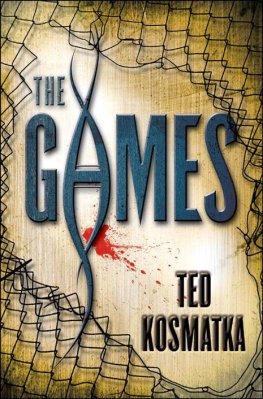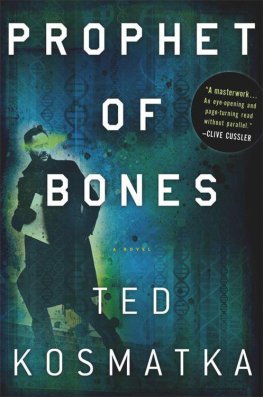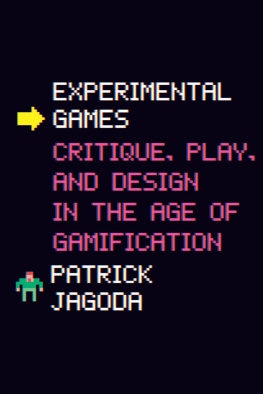The boy lay motionless in the tube as the machine moved all around him. He held his breath and concentrated on the pinging, trying to clear his head like the white coats told him.
Look into the screen, Evan, a voice said from a speaker near his ear.
Evan blinked against the sudden burst of white static and turned his head away.
Theyd said this was going to be the last test, but theyd said that once before. They had lots of ways to test you here.
What are you looking for, exactly? Evans mother asked from her spot near the door. She was backed against the wall, holding her purse tightly to her abdomen as if afraid to move farther into the room.
Gross abnormalities, the man at the computer said. He didnt look up from his terminal as the machine continued its slow spin.
Evan glanced back at his mother. They think Im gross.
There were four men in white coats in the room now, though only one was what his mother called a real doctor. The two younger men were testers from the special school, and the oldest man wore a dark tie under his white coat and probably wasnt any kind of doctor at all. That one scared Evan most of all.
The machine made a new noise, a clicking sound that Evan felt along the sides of his head. Whats it doing? Evan asked, trying to sit up in the cramped tunnel.
The man with the tie stepped away from the computer and gently guided the boy onto his back again. You must remain still. This is a big camera, and its taking pictures of the inside of your head.
I dont see a flash, Evan said.
It uses magnets, not light.
Can it tell what Im thinking?
No, the man said.
But theyd said that before, too. Evan knew better; all these tests were to see what he was thinking. His mother told him so. Because of what he did to the game. Because of what happened to Mr. Jacobs.
Evan concentrated on being still. He didnt trust the man, didnt like the way his eyes tightened when he looked at the computer screen. What did he see? How gross am I? Evan closed his eyes.
Mrs. Chandler
Miss, she interrupted.
Oh, sorry, the man at the computer said. He was the real doctor, and new to Evans case. Were there any complications with your pregnancy when you were carrying Evan?
No.
Any family history of birth defects or deformity?
Nothing like that, no.
Mental illness, learning disabilities?
Some of that, yeah.
Who?
My brother.
What was his diagnosis?
I dont know; he died when I was young. Why are you asking me all this? Did you find something?
The mans eyes lifted from the terminal to her face, then dropped again. It was the man with the tie who spoke: Sub-cranial morphology can vary widely between normal individuals. Theres nothing to worry about.
The machine clicked again. You need to calm down, Evan, the man at the computer said into the microphone. Your activity is all over the place, and we need a baseline. You have to relax.
Im trying, Evan said.
Think of something enjoyable.
So Evan thought of his mother. He thought of times between his mothers boyfriends, when he didnt have to share her. He thought of times before the problems at school, before the new teacher Mr. Jacobs found out that he couldnt count numbers right. Before Mr. Jacobs found out he couldnt read.
Good. Now look into the screen, Evan, the man said.
Evan opened his eyes, and the static was gone, replaced by a blank screen. Then, on that screen, a number flashed.
What do you see? the man asked.
I see a four, Evan said.
Good. What color is the number?
Its white.
Good.
More numbers flashed on the screen. Five, three, six, nine. Then letters appeared.
What do you see now? the man asked.
Numbers and letters.
What colors are they?
Theyre all white.
All of them?
Yes, Evan said.
The screen faded to black. You did good, Evan, the man said. Now were going to try something different.
The black screen flashed and was suddenly full of spinning gears. The gears were of various sizes and colors, and they spread across the screen in an unbroken chain, each one touching one or two others and all of them moving in unison. The smallest gears moved quickest; the larger ones seemed barely to move at all.
What do you see? the man asked.
I see gears.
What are they doing?
Theyre turning.
Good, Evan.
The gears stopped.
If the top gear was turning toward the left, the man at the computer said, which direction would the bottom gear be turning?
Up, Evan said immediately.
Which is that, clockwise or counterclockwise?
Up, Evan repeated.
Evans mother spoke: He doesnt know about clocks, or left or right. I tried to teach himI mean, we all tried to teach him. Her voice trailed off.
The man stepped from his computer and bent to look into the tube at the boy. If this gear was moving like this, he said, pointing and turning a circle with his finger, then which direction would this gear way over here move?
Up, Evan said, pointing along the gears outside edge, indicating a clockwise rotation.
The man smiled. So it would.
The next series of images were more complex, but Evans answers were just as immediate and just as correct. He didnt have to think about it.
Lets try something different now, the man finally said.
It started easy enough. Strange new shapes appeared on the screen. They werent gears, exactly, but they had spikes and grooves and jutting angles that let them fit together the way gears do. The man bent near the tube again and showed him how by manipulating a control ball near his hand, Evan could change the images on the screen. He could move them.
These are three-dimensional puzzles, Evan, the man said. Your teachers tell us that you are very good at puzzles. Is that true?
Im pretty good, Evan said, but hed never seen puzzles like this before.
He experimented, moving one image toward another, turning it so their grooves lined up. The images merged, and a chime sounded.
Good job, Evan, the man said, and walked back to his computer. Now well try some harder ones.
New, complex shapes appeared on the screen. Evan had to rotate each one completely to get a good look, because all the sides were different. He moved them together. He found where they fit. The machine chimed.
Good, Evan.
The solutions came easily. The complexity of the spatial configurations pulled him in, focused him to a fine point of concentration. Something was happening in his head; he felt it, as if some hidden green part of him was warming in the sunshine. The world around him retreated, became remote, irrelevant.
He no longer noticed the tube, or the computer, or the room with its four white walls and four white coats. There were only the puzzles, one after another, in a blur of shapes he manipulated with the controls at his fingertips.
He worked puzzle after puzzle, listening for the chime when he got them right.
Then the screen was empty, jarringly empty, all at once. It took him a moment to come back to himself enough to speak.
More, he said.
There are no more, Evan, the man said. Youve solved them all.
Evan glanced out of the tube, but the white coats werent looking at him. They stared at their computer terminal.
The man with a tie was the first to look up from the glowing screen. He wore an expression Evan had never seen pointed at him before. Evans stomach turned to ice.
HOSPITALS ALWAYS stank. There was something strange and sickly about the air in the building, and the breeze coming through the screen window hardly improved it. Evan could smell the garbage that lay heaped in the alley several floors below. Still, he moved closer to the window, pretending interest in the view because looking out the window was easier than looking at his mother. She sat at the big, glossy table. She was crying, though she did it silentlyone of the tricks shed picked up during her time with her last boyfriend.










![Jesse Schell [Jesse Schell] - The Art of Game Design, 2nd Edition](/uploads/posts/book/119435/thumbs/jesse-schell-jesse-schell-the-art-of-game.jpg)

